- Home
- Gerald Hammond
Hook or Crook Page 7
Hook or Crook Read online
Page 7
‘The last house on the left,’ Bea said. ‘But I don’t think you’ll find him at home. The “No milk” notice has been hanging on his gate all week. And now, it’s time that I was going. Thank you for dinner; you must come and eat with me soon.’ She shook hands politely all round and left the room, only to return a few seconds later. ‘If you want to ask about the poaching and its effect on your beat, the ghillie and the water bailiff are having a drink together in the bar.’
‘Lead on,’ said Eric, heaving himself to his feet.
‘A moment,’ Tony said. We paused. ‘I’m supposed to see a . . .’ He produced and riffled through his notebook. ‘. . . a Henry Codlington. He is believed to be resident here.’
I could feel Eric’s eyes trying to catch mine but I avoided contact. ‘If we see him, I’ll point him out,’ I promised.
Henry Codlington was talking gloomily to Alec the barman at the far end of the bar. The room was filling up and Tony had to push his way through. Friday night is the traditional night for the working man to drink what his wife has allowed him to keep out of his wages or for the office worker to celebrate the end of the working week. There was a rich mixture of accents. Bantullich is at the limit of daily commuting distance from Aberdeen but suits the oil industry workers who fly offshore from Dyce. Most of the English regional accents were represented and several American.
Bea, when she had introduced us to two men who were sitting apart from the crowd, went on her way, murmuring vague promises about seeing us again. The men, at first, eyed us patiently, as if we were necessary interruptions to more important business, but when Eric had called up a large malt whisky apiece they let it be known that our company was now acceptable. Their accents were local.
Bill Gheen, the ghillie employed by Strathdee Castle Estate, was a man of about thirty, round-faced and cheerful-looking despite the remains of what must have been a magnificent specimen of a black eye. He was unknown to me, having taken over the post on the retirement of Archie Struan. As part of the necessary preliminaries, which included polite enquiries as to the season so far, I asked after the old man who had been a friend for many years. He still lived near by and, I was told, had heard of my arrival and expected a visit. The world of salmon fishing is a small one.
The water bailiff, Mr Donaldson — the ghillie addressed him as Ed — was an older man, very lean, with grey hair beginning to thin. He must have been nearing fifty but he looked very fit. The steel in his eye suggested that he would be a hard man in a scrap.
‘So you’re fishing our Number One Beat from tomorrow’s morn,’ Gheen said.
‘That’s right,’ Eric said. ‘They tell me you’re busy with the American visitors, but we’d be grateful if you could spare a few minutes to show us the lies.’
‘I will if I can,’ he said politely. He leaned this way and that to see whether his clients were in the bar. Apparently they were not. ‘Those Americans won’t even change a fly for themselves, let alone land a fish. It’s nursemaids they need, not a ghillie. I damned near asked one of them if he wanted his nose blown, but he’d likely have taken me up on it. If I can leave them fishing, I’ll come and set you right. But Mr James is an old hand here, he’ll look after you.’
Eric judged that enough time had been spent on the courtesies. ‘Will our beat be fishing all right?’ he asked. ‘We were told that it had been poached.’
Bill Gheen looked hurt. ‘It’ll be fine,’ he said. ‘Not a fish did they get.’
‘But if they’d already put Cymag in the water . . .’
The two men smiled tolerantly. Rather than let them think that we were both ignorant I said, ‘Cymag only works in small pools, not wide rivers. You’d better tell him about it or he won’t sleep tonight.’
Gheen glanced at the water bailiff, who was employed by the river board. Prevention of poaching was his business and he had powers of arrest.
Donaldson glanced from one to the other of us, as if wondering whether information would be put to bad use. We must have satisfied him because he said, ‘This is how they work it. A gang is maybe four men. They start downstream. Where there’s a wee brig, as here, they’ll walk down ilka side; other places, ane or twa men’ll wade or swim across, or I’ve kenned them use a rubber dinghy, taking the end of a stout rope wi’ them. The rope’s weighted, if that’s what’s needed to sink it, and it’s dragged up the bottom of the river to feel if there’s any bad obstructions, or maybe some cleeks.’
‘What are cleeks?’ Eric asked.
The bailiff sighed. ‘I’ve spent half the day explaining to yon young bobby who sounds as Highland as Rob Roy hissel’. Cleeks are iron bars wi’ a hooked or T-shaped top, fixed in the river-bed specially to prevent netting.’
Eric looked worried. ‘Don’t they ever catch an angler’s line?’
‘Very rarely,’ Gheen said. ‘A’most never at this time o’year when you’re fishing a floating line. Whiles, a fish’ll tak’ the line round ane o’ them, and then you’ve got a problem — but that’s what us ghillies are for. Onyway, you’ll no’ be troubled that way in the first pool, because those lads had the cleeks out.’
‘If the cleeks are just hammered in,’ said Donaldson, ‘a strong gang wi’ a stout rope can howk them out again.’
‘I’ve told the factor and the laird that, o’er and o’er,’ the ghillie said disgustedly. ‘The only sure way’s to set each cleek in a concrete block and tak’ a machine down when the water’s low to sink them in deep. But the laird’ll no’ spend the siller unless Seamuir pays half and they’ve never yet been willing, the both of them, to spend the money at the same time. The matter’s been put off and put off.’
‘Aye,’ said the water bailiff. ‘It’s a pity, but there it is. Weel now, when they’re sure the bottom’s free and clear they use the rope to pull the net across and they draw it down the pool and round, sweeping up a’most ilka fish in the pool.’
‘It sounds like a lot of hard work in the dark,’ Eric said, ‘and a high risk of being caught. Is the game really worth the candle? Or are they doing it for the sport of it?’
‘Wi’ salmon the price it is for a pound? And a salmon weighing fifteen or twenty pound or more?’
‘But surely they don’t get full value for it? They’d be selling it at the back doors of hotels.’
The bailiff grunted. ‘Mair often than no’, yon fish are at Billingsgate market by the next night. A good evening’s work can be worth thousands to them, just thousands,’ he said bitterly. ‘Compare that wi’ the piddling fines the courts impose and the risk of losing a rusty old van and a net you could put in your pouch.’ He leaned forward and glared as though Eric and I were to blame for the failings of the sheriff courts. ‘The pickings are so good there’s a dozen gangs at it. They come from all over, Dumfriesshire even and beyond.’ He sounded as though Dumfries was at the far end of the earth.
‘What went wrong with their plans on Monday night?’ I asked.
Again the considering look. ‘I’m no’ wanting to say o’er much,’ the bailiff said. ‘If the gangs kenned a’ the ways we have for catching up wi’ them, they’d be even wiser than they are and we’d no’ stand a chance. They have their sources of information, local men who’ll let them ken when the river’s full o’ fish. Aye, and likely come out wi’ them and guide them around the river. Let’s just say that we try to have friends around who’ll give us a phone if they see movement at night or hear a vehicle go down towards the river at a time when honest folk are in their beds.
‘Monday night, I was just thinking of my own bed at the back of eleven when the phone went and a lady was on the line. I’ll not tell you who she is, but there’s not much excitement in her life so she keeps an eye out for us and maybe she gets a fish or two from the factor now and again in return. She was driving home when she saw the lights of a vehicle turn down the lane, coming towards the river the far side from here.
‘I phoned the police, but it would take them long enough to get here and then
likely there’d only be two of them at the most. I’m responsible for a good few miles of the river, but it happens I live not far away from Bantullich so I phoned young Bill here and picked him up in my Land-Rover.
‘We went in by the same route the poachers had taken. After the first half-mile it’s little more than a footpath, but it’ll take a Land-Rover. It’s the only way a vehicle can get down to the brig. We’d not the least intention of getting into a rammie, just of disabling their vehicle or blocking it in. If I’d a damn bit of sense I’d’ve stopped short, but you aye think of these things later.
‘The track runs downhill a bittie, so I killed my engine and freewheeled maist o’ the way. I’d only on my sidelights, so when we came on their van facing us, about a hundred yards back from the brig, I dashed nearly ran intil’t.
‘We got out of the Land-Rover. I could barely see the van by my parking lights, but enough that I could have stopped them driving it. I aye carry an apple in my pouch’ — he patted a bulging pocket of his tweed jacket — ‘and if I don’t use it I can aye eat it later. Wi’ that up his exhaust, he’s stuck.
‘What I didna’ see was that the beggars had left a man on guard. We were just coming to the van when its engine started and it backed awa’ towards the brig, going like the clappers of hell and the horn blowing fit to waken the deid. He was a bonny driver, I’ll say that for him, backing full dreel on a narrow track in the dark wi’ only his reversing lights and his door mirrors to steer by.
‘Just seconds later, we heard his doors slam and he was coming back at us. We could’ve got intil the Land-Rover and locked the doors, but you feel terrible trapped that way. Instead, I locked it up and we went back among the trees.
‘That should haud them, we thought, until the police arrived, but no’ a bit of it. The van stopped. There was five of them got out and damned if they didn’t start to lift the side of the Land-Rover, trying to cowp it intil the ditch.
‘Weel, I wasna’ for that. It’s my ain Land-Rover. What I should’ve done was to use my apple, but I was o’er feared for my vehicle to think of it. I rushed out, and Bill wi’ me, and we pushed at the other side of the Land-Rover. It was gey awkward, the ditch being in our way, but they couldna’ get it o’er. So, next thing, they dropped it and we were in the middle of the very de’il o’ a stishie. Ane o’ them took a swing at me wi’ a priest that’d hae ta’en the heid off me if it’d landed and I’m a’ strappit up yet wi’ three ribs cracked and Bill got a dunt on the heid that laid him out. Then they turned back to the Land-Rover and cowped it a’ together. They must ha’e been strong lads, for it needed echt men to roll it back again.
‘They drove past. I just managed to move or they’d ha’e been o’er the top of me, no’ that they was caring — I’d recognized some o’ them and likely they guessed it. Glasgow way they come from. I don’t have their names yet, but I’ll catch up wi’ them some day and then we’ll see who ends up wi’ the sair ribs.
‘And that’s about it a’. It was another three-quarters of an hour afore the police arrived. I’m told that another couple of pools near Drumoak were netted the same nicht, but that’s no’ on my patch.’
‘By the same gang, you think?’ I asked.
He shrugged. ‘There’s no way of telling. They weren’t seen. There’s plenty o’ the beggars. It could’ve been some o’ the others.’
‘Was there still a motor-caravan parked not far from the track at that time?’
The two men looked at each other. ‘Yon young bobby asked the same thing,’ said Bill Gheen. ‘We can only tell you what we told him. It could’ve been there when we arrived, we wouldn’t ha’e seen it. By the time the police came, there was no sic thing. There was lights a’ o’er the place.’
Eric offered another round, but they refused. They had no more to tell us except for a few tips about the fishing and a few minutes later they left to do a patrol of the more vulnerable stretches of river.
‘What do you reckon?’ Eric asked me.
‘I’m doubtful,’ I said. ‘The poachers were disturbed, but they managed to get moving in seconds. That doesn’t sound as though they had a body to move. And they couldn’t have netted two more pools and still had time for a trip to Granton.’
‘Drumoak could have been a different gang. Or, dammit, there were five of them. Could three men do the netting?’
‘I think so.’
‘Well then. Suppose that one man had a car handy.’
‘Why would he?’
‘I don’t know why,’ Eric said impatiently. ‘Perhaps at least one’s a local. Hollister went down to try for sea-trout and met up with the poachers when they’d finished the rope trick but before they started netting. One of them tapped him on the head harder than he meant to. They loaded the body into the van and went back to collect their net and the rope. That’s when Donaldson and Gheen turned up. Two of them went over the Lecht to Granton while the others gave themselves a sort of an alibi by poaching two more pools a long way downstream.’
‘How did they know that the caravan belonged to Hollister?’
‘One of them was local. Or they did a reconnaissance earlier in the week,’ Eric said glibly.
I thought it over. ‘Fair enough,’ I said. ‘But why would they move the caravan to the Spey? What good did that do them?’
‘How do I know?’ he said irritably. ‘Maybe they’re well known for poaching only on the Dee.’
‘And why the Spey? The upper Tay would be on their way home, or some of the lochs.’
‘Misdirection,’ Eric said.
Fuelled by alcohol and a lack of adequate information we could have kept up the argument until closing time, but we were interrupted by Harry Codlington, who bent down to put his hands on the table. I was about to offer him a drink when I realized that he had adopted his uncomfortable posture in order to glare into our faces.
‘Damn you!’ Harry said with quiet fury. Even the locals at the next table could hardly have heard a word. ‘Damn you both to hell! What business is it of yours if I was in Granton?’
‘None at all,’ Eric said. ‘What the hell are you talking about?’
In his fury, Harry was making the table quiver so that two glasses tinkled together. I moved them apart. ‘Don’t give me that,’ Harry said. ‘This afternoon I told you, in the bar here, that I’d been over to Granton on Monday and hardly any time later the police are following me up, wanting to know what I was doing and who I was doing it with and whether anybody can corroborate what I’m telling them.’
‘Well, we didn’t give you away,’ I said. ‘Sam Bruce was in the bar, but I can’t see that he’d take the trouble either. You only said that you’d gone over to visit friends —’
‘And for a casting lesson,’ said Eric.
‘— and for a casting lesson,’ I amended. ‘Why would we expect that to give the police palpitations?’
‘Then how did they know?’ Harry demanded doggedly, still keeping his voice down.
‘Probably,’ Eric said, ‘you parked in the provost’s designated parking place and got your number taken. How would we know how they know? And why do you care?’
‘Never you mind why I care. I’ve just told that young bobby and I’ll tell you the same, it’s nobody’s bloody business who my friends are in Granton and I’ll thank you to remember that and not to tell tales behind my back.’
He turned and jostled his way through the throng of drinkers, spilling drinks.
‘Well, well,’ said Eric. ‘Well, well, well, well, well!’ Which, I thought, summed it up adequately.
Chapter Seven
Tony McIver did not return that evening. I made my routine phone-call home and took myself off to bed. I woke once to hear footsteps and low voices below my open window, but soon slept again.
While we were browsing through the papers, obligingly if sleepily brought from the village shop by Miss Bruce, over a cooked breakfast served by that same young lady, Tony McIver made his appearance. He took the chair
which had been brought to our table for Bea the previous evening and looked pathetic until Miss Bruce brought him toast and coffee.
‘Have you been home over the Lecht and back again?’ Eric asked him from behind the Telegraph.
‘No. They found me bed and breakfast in the village here,’ McIver said, buttering toast. ‘I’m using my own car and nobody wanted to pay my mileage twice a day. B and B worked out cheaper.’
‘Was the second B inadequate, then?’
Tony McIver paused with his toast half-way to his mouth. ‘It was all right. But it was a long time ago,’ he said, with the self-righteous air of one who has been at work early on a Saturday.
There seemed to be no point in opening a conversation with someone whose mouth was now full of toast and marmalade. We went back to our newspapers. Tony ate with dedication. (His boyish appetite brought back the days when I had taught him to fish. I still thought of him as I had then, as Tony, although I hesitated to use his first name aloud. His new status as an officer of the police seemed to transcend the fact that he had once been my pupil.)
Some minutes later we heard him lay down his knife and pour more coffee. ‘I’ve been typing statements and faxing them to my chiefs,’ he said, with the same air of virtue.
We laid down our papers again. ‘We put in an hour fishing before breakfast,’ Eric said haughtily.
This introduced a topic which was obviously important. ‘Did you do any good?’
‘I had a pull, but he let go before I could hook him,’ Eric said. ‘There are fish there. It’s just a matter of coming to terms with them.’
‘That is true?’ I said. ‘All you have to do is be cleverer than a creature with a brain the size of a pea?’
Eric refused to be drawn. ‘What did Imad Vahhaji have to say for himself?’
‘Nothing. His house was dark and silent. But there’s a Porsche in his garage, I could see it through the window.’

 Home to Roost
Home to Roost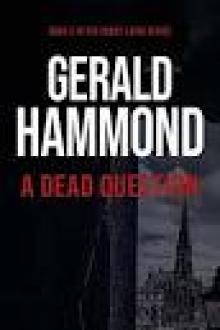 A Dead Question
A Dead Question Twice Bitten
Twice Bitten The Curse of the Cockers
The Curse of the Cockers In Loving Memory
In Loving Memory Illegal Tender (Three Oaks Book 12)
Illegal Tender (Three Oaks Book 12) Cold Relations (Honey Laird Book 1)
Cold Relations (Honey Laird Book 1) A Brace of Skeet
A Brace of Skeet Silver City Scandal
Silver City Scandal Sauce For the Pigeon
Sauce For the Pigeon Cold Relations
Cold Relations Hook or Crook
Hook or Crook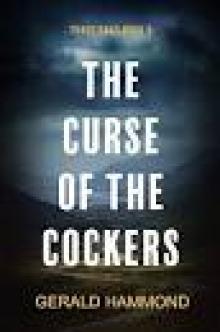 The Curse of the Cockers (Three Oaks Book 5)
The Curse of the Cockers (Three Oaks Book 5) Snatch Crop
Snatch Crop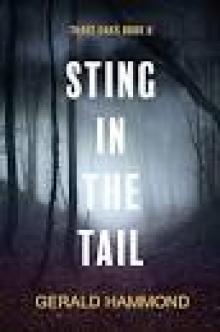 Sting in the Tail (Three Oaks Book 6)
Sting in the Tail (Three Oaks Book 6)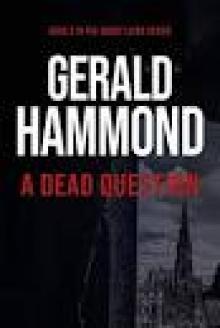 A Dead Question (Honey Laird Book 2)
A Dead Question (Honey Laird Book 2) In Loving Memory (Honey Laird Book 3)
In Loving Memory (Honey Laird Book 3) Thin Air
Thin Air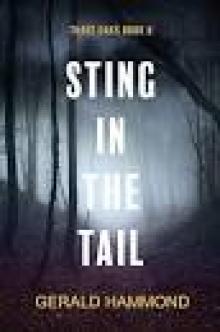 Sting in the Tail
Sting in the Tail Pursuit of Arms
Pursuit of Arms The Game
The Game Give a Dog a Name (Three Oaks Book 4)
Give a Dog a Name (Three Oaks Book 4) Fair Game
Fair Game The Executor (Keith Calder Book 10)
The Executor (Keith Calder Book 10) Whose Dog Are You? (Three Oaks Book 2)
Whose Dog Are You? (Three Oaks Book 2) Mad Dogs and Scotsmen (Three Oaks Book 7)
Mad Dogs and Scotsmen (Three Oaks Book 7) Cousin Once Removed
Cousin Once Removed The Worried Widow
The Worried Widow A Shocking Affair
A Shocking Affair Dead Weight (Three Oaks Book 11)
Dead Weight (Three Oaks Book 11) Whose Dog Are You
Whose Dog Are You The Revenge Game
The Revenge Game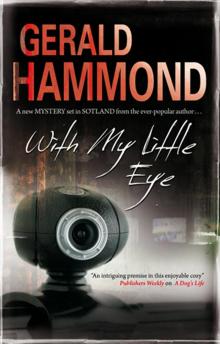 With My Little Eye
With My Little Eye Doghouse (Three Oaks Book 3)
Doghouse (Three Oaks Book 3) In Camera
In Camera Bloodlines (Three Oaks Book 8)
Bloodlines (Three Oaks Book 8)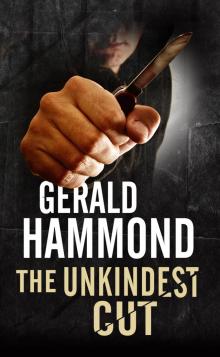 The Unkindest Cut
The Unkindest Cut